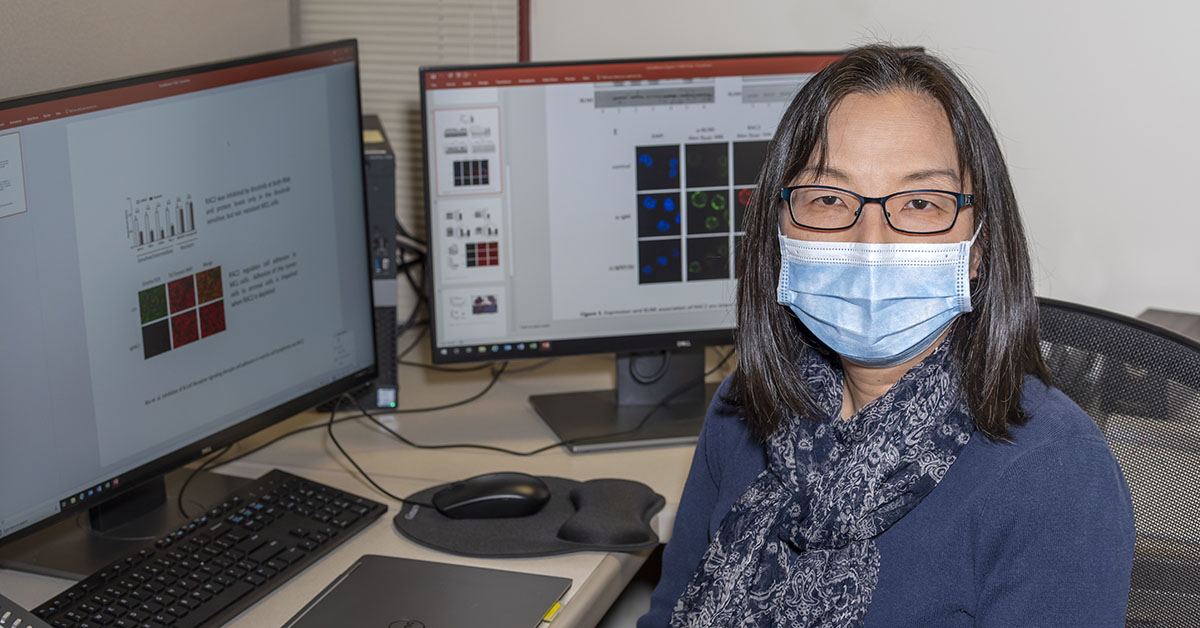
PHILADELPHIA (December 7, 2020) – Y. Lynn Wang, MD, PhD, FACP, a professor in the Department of Pathology and Blood Cell Development and Function program at Fox Chase Cancer Center, recently published a comprehensive review of molecular biomarkers in chronic lymphocytic leukemia (CLL), the most common leukemia in adults in the United States.
In the review, Wang discusses both prognostic biomarkers, those that help indicate risk of disease development regardless of treatment, and predictive biomarkers, those that identify individuals who are more or less likely to benefit from a specific treatment, for CLL.
“Although CLL is an indolent disease, the first question clinicians face is whether or not to treat,” Wang said. “That is because about one-third of patients will never need any treatment, one-third of patients will have intermediate risk of disease progression that needs to be watched closely, and one-third of patients will have aggressive disease that needs to be treated right away.”
According to Wang, the review organizes information about prognostic and predictive biomarkers using tables and diagrams that could be very useful to busy clinicians and other healthcare professionals. The review features an in-depth discussion of the most well-known and well-established biomarkers, including del (17p), TP53 mutations, del (11q), IGHV mutations, del (13q), trisomy 12, and others.
“If you lose the function of TP53 the disease will progress rapidly,” Wang said. “The patient will respond poorly to chemotherapy and to newer therapies as well.” In contrast, del(13q) and mutated IGHV are both associated with favorable prognosis. “When patients have these biomarkers, their disease is not as likely to progress. These patients have tumors that need to be watched so clinicians can take a watch-and-wait approach.”
The table also details emerging molecular markers that are associated with unfavorable prognosis: NOTCH1, SF3B1, BIRC3, and ATM, the biological functions of the gene, the frequencies of the gene mutations in newly diagnosed and treated CLL, the locations and types of the gene mutations, the abnormal function of the mutated genes, and their prognostic impact. These biomarkers have not yet been incorporated into major clinical guidelines but are expected to impact clinical practice in the future.
The review also discusses predictive biomarkers, specifically those related to emerging and approved targeted treatments for CLL. Prior to joining Fox Chase, Wang identified the first ever case of resistance to the Bruton tyrosine kinase (BTK) inhibitor ibrutinib, which she described in a New England Journal of Medicine report.
“A patient on a clinical trial developed worse symptoms on treatment,” Wang said. “We sequenced the patient genome and identified a point mutation in BTK.” The mutation prevents the drug from binding with the C481 residue that weakened the drug-BTK binding. As a result, ibrutinib was not effective against the tumor cells. Other mutations have also been identified that confer ibrutinib resistance, but more work is needed to discover other less common drug-resistance mutations.
Finally, the review also covers molecular predictors of risk of ibrutinib relapse, potential markers of impending ibrutinib response, and markers of resistance to other targeted agents such as venetoclax as well.
“Being able to detect these mutations will be very important,” Wang said. “These mutations develop while the patients are taking these oral drugs, making monitoring important.”
As researchers and clinical care teams learn more about these predictive markers, they will be able to better guide patients at higher risk for relapse into enrollment in promising clinical trials or into considering other treatment options.
The paper, “Prognostic and Predictive Molecular Biomarkers in Chronic Lymphocytic Leukemia,” was published in The Journal of Molecular Diagnostics.